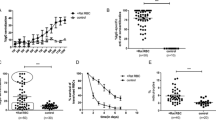Abstract:
Current treatments for autoimmune diseases, which rely on inducing generalised immunosuppression, are not only frequently ineffective, but also associated with serious side effects. There is, therefore, a pressing need to understand the mechanisms that normally prevent autoimmune damage, and how they can be restored. A key advance in recent years has been the demonstration that autoreactive helper T- (Th-) cells are pivotal in the development of animal models of autoimmunity, and therefore provide a target for specific immunotherapy. This paper reviews the role of Th-cell responses against red blood cells (RBC) in autoimmune haemolytic anaemia (AIHA), the mechanisms by which such responses are prevented in health, and how this knowledge can be exploited in the future to treat the disease.
Similar content being viewed by others
Author information
Authors and Affiliations
Rights and permissions
About this article
Cite this article
Barker, R. Controlling Autoimmunity: Lessons from Responses to Red Blood Cells. Comp Clin Path 11, 8–13 (2002). https://doi.org/10.1007/PL00010013
Issue Date:
DOI: https://doi.org/10.1007/PL00010013




